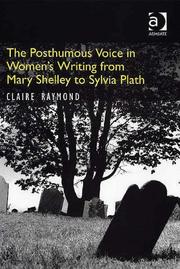Check nearby libraries
Buy this book

"This provocative book posits a new theory of women's writing characterized by what Claire Raymond calls 'the posthumous voice.' This suggestive term evokes the way that women's writing both forefronts and hides the author's implied body within and behind the written work. Tracing the use of the disembodied posthumous voice in fiction and poetry by Mary Shelley, Emily Bronte, Emily Dickinson, and Sylvia Plath, Raymond's study sounds out the ways that the trope of the posthumous voice succeeds in negotiating the difficult cultural space between the concept of woman's body and the production of canonical literature."--BOOK JACKET.
Check nearby libraries
Buy this book

Subjects
American poetry, Death in literature, English fiction, Feminism in literature, History, History and criticism, Women and literature, Women authors, English fiction, women authors, English fiction, history and criticism, 19th century, American poetry, women authors, American poetry, history and criticism, Femmes et littérature, Histoire, Mort dans la littérature, Féminisme dans la littérature, LITERARY CRITICISM, European, English, Irish, Scottish, WelshPeople
Sylvia Plath, Emily Dickinson, Emily BrontePlaces
England, United StatesTimes
19th and 20th century| Edition | Availability |
|---|---|
|
1
Posthumous Voice in Women's Writing from Mary Shelley to Sylvia Plath
2016, Taylor & Francis Group
in English
1351883666 9781351883665
|
zzzz
Libraries near you:
WorldCat
|
|
2
Posthumous Voice in Women's Writing from Mary Shelley to Sylvia Plath
2016, Taylor & Francis Group
in English
1351883674 9781351883672
|
zzzz
Libraries near you:
WorldCat
|
|
3
Posthumous Voice in Women's Writing from Mary Shelley to Sylvia Plath
2016, Taylor & Francis Group
in English
1315237644 9781315237640
|
zzzz
Libraries near you:
WorldCat
|
|
4
Posthumous Voice in Women's Writing from Mary Shelley to Sylvia Plath
2016, Taylor & Francis Group
in English
1351883658 9781351883658
|
zzzz
Libraries near you:
WorldCat
|
|
5
The posthumous voice in women's writing from Mary Shelley to Sylvia Plath
2006, Ashgate, Routledge
in English
0754655350 9780754655350
|
aaaa
Libraries near you:
WorldCat
|
Book Details
Edition Notes
Includes bibliographical references (p. ) and index.
Classifications
The Physical Object
ID Numbers
Source records
Better World Books recordLibrary of Congress MARC record
marc_columbia MARC record
marc_columbia MARC record
amazon.com record
harvard_bibliographic_metadata record
Work Description
This book is about women writers writing Self-Elegy. That is, they write elegies for themselves as if they were already dead when they were writing-- though of course they're still alive when writing their self-elegies! The book asks why self-elegies were a popular form of writing for a few important women writers in England and America in the 19th and 20th centuries. The book focuses on Emily Dickinson, Emily Bronte, and Sylvia Plath, with some chapters on Mary Shelley's novella Matilda, and Christina Rossetti.
Community Reviews (0)
Feedback?| December 15, 2022 | Edited by MARC Bot | import existing book |
| August 14, 2020 | Edited by ImportBot | import existing book |
| May 21, 2011 | Edited by 67.237.182.11 | Edited without comment. |
| December 5, 2010 | Edited by Open Library Bot | Added subjects from MARC records. |
| December 10, 2009 | Created by WorkBot | add works page |










